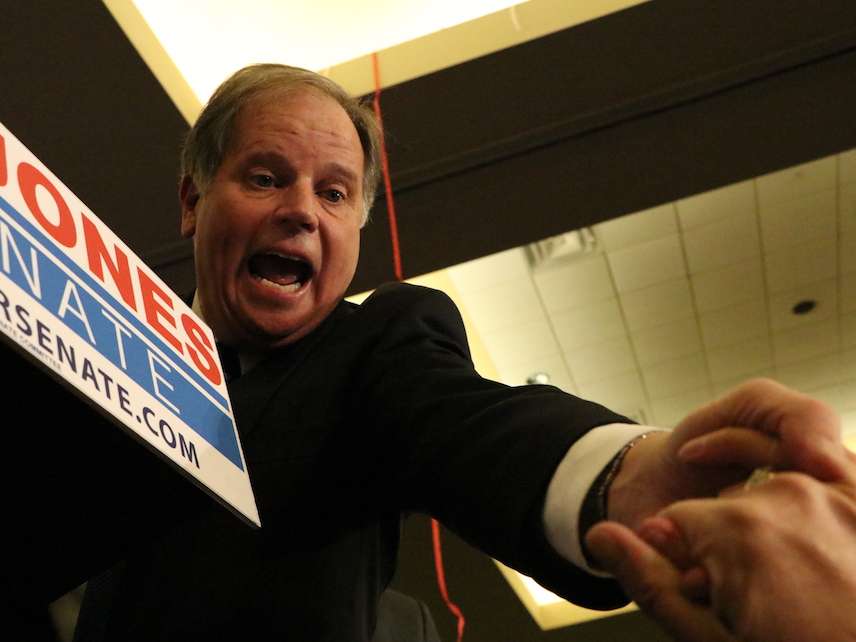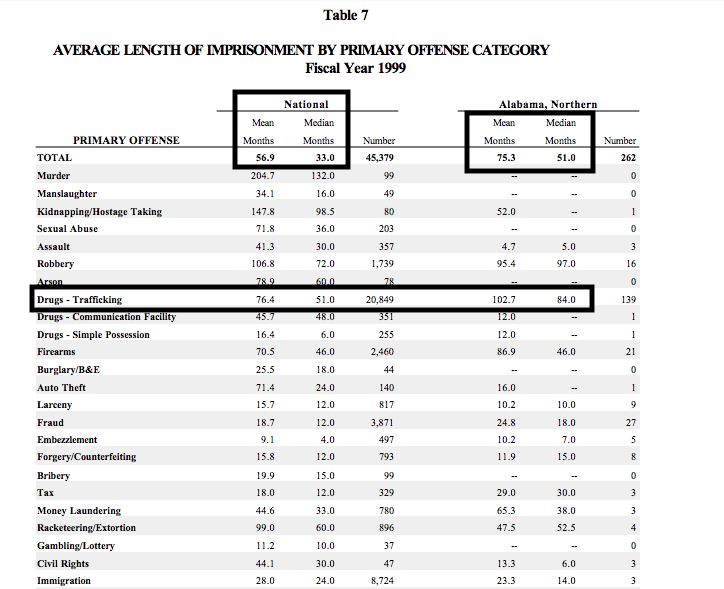Alabama Is Sending Another Former Prosecutor to the Senate. Will This One Be Different?
Will Doug Jones be a paladin for criminal justice reform, or a squish?

Before U.S. Attorney Jeff Sessions arrived in Washington, D.C., for a career in national politics, he served a 12-year stint as the U.S. Attorney for the Southern District of Alabama. President Ronald Reagan appointed him in 1981, just as Congress was about to turn federal prosecutors into demigods.
The Sentencing Reform Act of 1984 and the Anti-Drug Abuse Act of 1986 ended parole in the federal prison system and introduced the harshest mandatory minimum sentences in history, respectively. Sessions eagerly capitalized on these laws and his Senate career reads best as a two-decade quest to expand and enshrine the powers he once used to put men and women in cages.
That makes me very curious as to what kind of senator Doug Jones will be.
Like Sessions, Jones was a U.S. Attorney in Alabama (the Northern District). Like Sessions, Jones thinks his experience as a prosecutor qualifies him to make policy. You have probably heard by now that Jones prosecuted two of the four Ku Klux Klansmen who bombed Birmingham's 16th Street Baptist Church in 1963, an act of terror that killed four black children; and that he secured a conviction against Eric Robert Rudolph, another domestic terrorist who bombed two abortion clinics, a lesbian bar, and Centennial Olympic Park in Atlanta.
We don't hear much about his bad prosecutorial choices.
Of the 22 sentences secured by Northern District prosecutors that Pres. Obama saw fit to commute in his second term, two of those cases either began or concluded under Jones, who was U.S. Attorney for the district from 1997 to 2001. Ramiro Cervantes received 27 years in prison for a methamphetamine charge. Jimmy Dean Gibson, another meth offender, received a life sentence in 2001.
If Jones was once the kind of person who saw fit to put nonviolent drug offenders in prison for decades, or until they died, what kind of person is he now?
Here's Jones in an interview with the Montgomery Advertiser:
The candidate also says he opposes U.S. Attorney General Jeff Sessions' efforts to reverse sentencing reform efforts that have drawn support in both parties as prisons have become dangerously overcrowded. Sessions earlier this year told federal prosecutors to pursue the toughest sentences possible against defendants. As a federal prosecutor, Jones said, his "hands were tied" by mandatory minimums.
"I think there were times all of my colleagues worked around mandatory minimums and tried to get flexibility," he said. "That's what Jeff Sessions is trying to take away right now."
I looked at USSC's sentencing data from the Northern District during Jones's tenure to see how hard, exactly, he and his colleagues tried to "get flexibility." In fiscal year 1999, his office secured an average drug sentence that was more than two years longer than the national federal average:

The explanation for this disparity is that meth and crack, which have the two lowest quantity thresholds required to trigger a mandatory minimum, made up more than half of the drug cases Jones's office prosecuted that year (and every other year he was in charge). Prosecutors were enforcing the law as written, but I see no evidence they were trying to "get flexibility."
I don't propose to hang the failings of federal sentencing law on Jones, or any other U.S. attorney. But so long as we're assessing the good he did, we should think about the decisions he made that might inform his advocacy for people caught up in our berserk correctional system.
Sessions cited his experience as a reason to inflict more harm and steal more lives. What about Jones? What would he do differently if he could do it all over again? How proactive will he be in calling out the policies advanced by the former occupant of his Senate seat? What will he stand up for? Who will he stand up for?
Sens. Mike Lee (R-Utah), Patrick Leahy (D-Vt.), Dick Durbin (D-Ill.), Corey Booker (D-NJ) and Rand Paul (R-Ky.) could use some help advancing federal sentencing reforms, especially Leahy, who is creeping up on 80. The Bureau of Prisons should be pushed to explain why the halfway house system is such a mess and why the compassionate release program is covered in cobwebs. Someone needs to get the USSC's back as it considers amendments to the federal guidelines (the Justice Department under Sessions is already asking for the world on a silver platter).
On paper, Jones is more qualified to do these things than all but a handful of his Democratic colleagues. He's from the deep south, he served as a U.S. attorney, and he can illustrate, with two very compelling examples, where the heavy hand of the law is warranted.
But if he wants to distinguish himself from Sessions, he should consider adopting his predecessor's tenacious and unwavering commitment to shaping criminal justice policy. Sessions spent two decades successfully making the United States a more punitive place; Jones is obligated by virtue of his experience and his seat to do what he can to make it a little bit less awful.
Editor's Note: As of February 29, 2024, commenting privileges on reason.com posts are limited to Reason Plus subscribers. Past commenters are grandfathered in for a temporary period. Subscribe here to preserve your ability to comment. Your Reason Plus subscription also gives you an ad-free version of reason.com, along with full access to the digital edition and archives of Reason magazine. We request that comments be civil and on-topic. We do not moderate or assume any responsibility for comments, which are owned by the readers who post them. Comments do not represent the views of reason.com or Reason Foundation. We reserve the right to delete any comment and ban commenters for any reason at any time. Comments may only be edited within 5 minutes of posting. Report abuses.
Please to post comments


Who cares about former prosecutors? Why are we sending a child molester to the Senate?
No one cares about Doug Jones, not even Alabama, beyond the metric of 'he's not Roy Moore'. He could be a literal member of the KKK and no one would bat an eye.
SPOILER ALERT: His actions will continue to defy his words, the same as every other one of them who aren't overtly law-and-order statists. Cory Booker is the best you'll get from them on any kind of reform, and that's just because he was never a prosecutor.
Hopefully his future actions match his words. I dont know how helpful it is to look at how inflexible or flexible has was as a prosecutor, as his success as a prosecutor was clearly at odds with his stated feelings related to the policy. BUT its certainly interesting and worth discussing, especially since he brought it into question himself (likely just as mere puffery but whatever).
These are the kinds of questions that libertarians should be putting to candidates during the campaign; get them on record so, when they decide to vote differently, their hypocrisy is on record. For example, when Jones spoke before a black group, he should have been asked for specific justice reforms he would work for in the Senate.
Doug Jones is now the Susan Collins of the Democratic party. Susan Collins only votes for the Republican establishment position when there's no other choice--because her seat depends on not ticking off a slim minority of swing voters in Maine who usually vote Democrat. In Doug Jones' case, it's even worse. If Doug Jones has any hope of carrying that seat again, it will be because he doesn't differentiate himself from the average Alabama Republican.
If anybody who thinks Doug Jones' vote will make the difference on environmental issues, LGBTQI+, BLM issues like sentencing reform, drug war issues, gun rights, or anything else near and dear to progressive hearts, then they're probably mistaken.
Don't look at what politicians say. Look at the conventional wisdom for their constituency. W hat they say is just a rationalization trying to appease that. What they do is whatever they need to get reelected. They say all kinds of crap. Ignore it like Trump's tweets.
It might be one thing if there were a Democrat in the White House who could give him a cushy, high profile job for committing political suicide and voting against his constituency in Alabama, but that only becomes possible political eons from now. In the meantime, expect Jones to vote like a Republican would--and not necessarily a moderate one.
I wouldn't be so sure of that, but at the same time I suppose it depends on how much Doug wants to keep that seat. If he wants to stay in place, he'll need to be literally the only Democrat to cross the aisle and I don't see that happening on major pieces of legislation and that alone would be enough to sink his chances of reelection no matter which way his vote goes.
If he votes with the Republicans, the Democrats who helped elect him won't bother voting for him. If he votes with the Democrats, it will just be that much easier for Republicans to regain the seat.
It's almost a foregone conclusion that he'll be out of office the very next cycle. This is a pyrrhic victory for the Democrats, but at least they got their talking point.
It doesnt matter what he does. Hes now an incumbent. The DNC wont give him a primary challenge. If that challenge loses they destabilize the base & give reds something to campaign on. If they win they lose the massive incumbency advantage enjoyed by congress critters in a district that despises Dems & guarantees loss of the seat. The DNC arent the sort of true believer fellow travelers that the comment crowd here thinks they are. Some of the most successful members of the Ds made their career crossing party lines on critical issues. See Clinton on welfare reform, Joe Leibermans entire voting record esp during the bush jr administartion, et al
Mike Riggs sucking Democrat ex-USDA cock?
Why am I not surprised?